Long before he was thrust into the spotlight because of Rush Limbaugh’s
comments about Donovan McNabb, ESPN broadcaster Tom Jackson was
an All-Pro outside linebacker for the Denver Broncos. Though undersized
for his position, Jackson carved out a legendary 14-year career
that ended with his induction into Denver's Ring of Fame. How
did a guy nicknamed "Tiny Tom" enjoy so much success
in the NFL? With a rare combination of speed, heart and smarts.
Born in Cleveland,
Ohio, on April 4, 1951, Tom grew up idolizing Jim Brown, and dreamed
of following in his hero's footsteps. It appeared he might be
on his way, after a heralded high school career. But Tom eventually
learned that NFL teams—much less major college coaches—weren't
particularly interested in handing the ball to a 5-11 defensive
back who weighed less than 200 pounds. When Louisville came knocking,
he answered, and developed into one of the country's best small-college
linebackers.
The Broncos
also liked what they saw in Tom. When Denver rose to prominence
in the late 1970s—on the strength of its famous "Orange
Crush" defense—#57 was one of the main reasons why.
Two trips to the Super Bowl and three Pro Bowls later, he retired
as one of the most beloved players in franchise history.
Today, Tom
is still a fixture on Sundays, only now he's content to watch
the action from a comfortable seat in a television studio. As
a commentator for ESPN, he adds an insightful, reasonable voice
to the network's high-charged coverage of the NFL.
As a kid,
Tom was a talented all-around athlete and diehard fan of the Cleveland
Browns. Some of his best times were spent on Sundays at Municipal
Stadium with his father, rooting on his "Brownies."
With Paul Brown calling the shots, the Cleveland teams of that
era were dominant. When Jim Brown joined the squad in 1957, the
Browns became among the most feared clubs in football. Tom never
missed a game. He also loved baseball and wrestling. Forget spring,
summer, winter and fall, his childhood was split by three seasons.
|
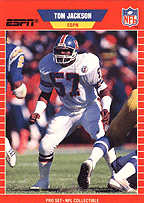 Tom Jackson,
1989 Pro Set
Tom Jackson,
1989 Pro Set |
| |
|
| Jdapoxe.com:
|
What
sports memories do you have from your childhood in Ohio?
|
|
| |
|
|
| Tom
Jackson : |
I played
baseball in the Police Athletic League when I was a youngster,
and started wrestling when I got to high school. I enjoyed all
the same sports as the children in the neighborhood. In those
days when you grew up in the same house through high school and
into college, the neighborhood children were all very competitive.
I was really into wrestling throughout high school—165-pound
weight class, 175-pound weight class and then into heavyweights.
When I'm
back home, I tell all my old friends that they, as much as anything,
contributed to my success. As children we'd often be sitting on
the porch and someone would say "Hey, let's race around the
block." And then we'd all go for it. I have vivid memories
of winning some of those races and that competitive fire is still
with me. In fact, I used that competitiveness later on in the
NFL, when I lined up against the Oakland Raiders and the Kansas
City Chiefs.
If there's
one person who made the biggest difference in my athletic career,
it was my wrestling coach in high school. He was a 140-pound guy
named John Bianchi, the toughest little Italian man I ever knew.
He drove us unbelievably and probably drove me more than he drove
the rest of my teammates. At times I couldn’t understand
the amount of pressure that he would put on me. But I’ve
always said, as I’ve looked back, he was the beginning of
whatever I did professionally, because he just didn't hone my
wrestling skills, he developed me mentally to do things beyond
what I thought I could do. I had matches in the sectionals and
regionals where I felt I couldn't go another inch, but he told
me that I could do it and that I had to do it. I look back very
fondly on his help building of my character.
|
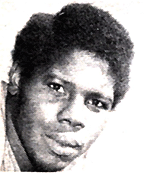 Tom Jackson,
Tom Jackson,
1970s publicity photo |
| |
|
|
| Jdapoxe.com:
|
Did
sports teach you any other lessons?
|
|
| |
|
|
| Tom
Jackson: |
You have
to overcome fear of failure, which was most evident in wrestling.
When I wrestled in high school, I started out in 10th grade at
the 165-pound weight class. In wrestling, you're always competing
against someone who’s a similar weight. But, by the time
I was a senior, I was right at 185 pounds. I didn't want to lose
the weight and go down to 175, so that left me in the heavyweight
unlimited category. The first guy I ever wrestled against in that
category was a guy who weighed nearly 240 pounds. I remember the
moment I stepped on the mat—there was a sense of fear. I
was wrestling a guy who was much bigger than me, but my mind set
was "overcome that fear and do the best you can." I
ended up pinning him and that was the beginning of a great year
in wrestling. I reached the Ohio state finals that year, where
I lost, finishing as a runner-up.
Sports
are about dedicating yourself to something that you want to do
and then striving to achieve that. It means sacrifice and staying
late after practice. Those are two qualities that stayed with
me through my years in the NFL. I had professional coaches that
really never understood my love of practice. I loved everything
about football. I loved to practice. I loved lying there in a
puddle of sweat, exhausted and knowing that I was preparing myself
as best I could to be successful on the weekend.
|
|
Tom's work
ethic carried him farther in sports than most people expected.
A star on the gridiron, wrestling mat, and baseball diamond at
Cleveland's John Adams High School, he hoped to suit up for Woody
Hayes
and Ohio State. But the Buckeyes never called. Instead, Tom headed
to Louisville in the fall of 1969, where Lee Corso was trying
to bring the moribund program back to life. The rookie coach saw
something special in Tom, converted him to linebacker, then watched
him develop into one of the school's greatest players ever. After
sitting out his freshman year, he led the team in tackles for
three consecutive seasons, matching Doug Buffone's triple from
1963 to 1965. Thanks to Tom, Corso built a swarming defense that
enabled him to complete his reclamation project ahead of schedule.
In 1972, the Cardinals shut down everyone they faced—including
New Mexico State's Joe Pisarcik and the tandem of Ray Rhodes and
Drew Pearson at Tulsa. Louisville went 9-1, and finished ranked
in the Top-20. Tom was voted the Missouri Valley Conference player
of the year for the second time of his career.
In 1999, the
Cardinals retired Tom's jersey (#50). With the honor, he joined
the likes of Buffone, Lenny Lyles, Ernie Green, Frank Minnifield
and Louisville's most famous football alum, Johnny Unitas.
|
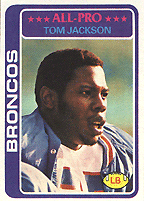 Tom Jackson,
1978 Topps
Tom Jackson,
1978 Topps |
| |
|
|
| Jdapoxe.com:
|
How
did you end up at Louisville?
|
|
| |
|
|
| Tom
Jackson: |
As a youngster,
I wanted to play so badly for Ohio State, but that didn’t
materialize. I was visited by Lee Corso from Louisville—not
an assistant coach, but the head coach himself. He said that if
he could get a couple of players like me from the Cleveland area,
then we could reinvigorate the football program. I bought into
that. He sounded sincere to me. I always thanked him for giving
me that chance to play and for feeling that I wasn’t too
small to play football.
|
|
Tom expected to go high in the 1973 NFL draft, but his size worked
against him again. Though teams liked his speed and intelligence,
he lasted until the fourth round, when the Broncos took him. Irritated
that he had been overlooked, Tom then spent his first few years
in Denver convincing his coaches he could handle the rigors of
playing every down. He enjoyed a breakout season in 1976, intercepting
seven passes. Big plays became his trademark. Equally effective
rushing the quarterback as he was dropping back in pass coverage,
Tom retired fifth on Denver's sack list with 44 and first among
linebackers with 20 interceptions. Amazingly durable, he stands
second only to John Elway on the team's all-time list of games
played with 191.
When Red Miller
assumed the coaching reigns in 1977, Randy Gradishar, Joe Rizzo,
Bob Swenson and Tom emerged as one of the NFL 's top linebacking
units—the juice the fueled the Orange Crush. The Broncos,
in turn, made the first of their two Super Bowl appearances during
Tom's career in 1978. The second came in his last season, 1986.
Along the way, Tom went to three Pro Bowls, and was named All-Pro
twice. His teammates also voted him Denver's Most Inspirational
Player a franchise-record six times.
|
|
| |
|
|
| Jdapoxe.com:
|
After
being told so many times that you were too small and not strong
enough, did you ever envision having such a long and distinguished
career?
|
|
| |
|
|
| Tom
Jackson: |
No, I
never thought I'd have 14 years in the NFL. I never thought about
being the Most Valuable Player in the Missouri Valley Conference.
I just thought about being the best player I could be. I always
thought in terms of the next step. In 1973, my first year with
the Broncos, I was a starting linebacker. I was on a pretty good
defense, not great, but good. "What’s the next step?,"
I asked myself. Can I hone my skills enough to make it to the
Pro Bowl—which means the defense gets better as I get better?
When I
was in college I did not have a great set of hands and yet I intercepted
20 passes as a pro. That’s pretty good, especially in a
30 defense. While in college, I slept with the football, which
meant that I often rolled over in bed onto the football, but at
least my hands were touching it and cradling it. In my mind what
I was doing was getting comfortable with that football. So, in
competition, I never felt awkward when the ball came my way. I
thought it paid off in the end.
As for
long-term goals, you set goals short-term and they end up being
long-term goals. When I entered the NFL, I didn’t set my
mind on a 10-year career, I just focused on being the best player
that I could be at any given time.
I had
an interesting experience in my first regular game with the Broncos.
It was in Denver versus the Cincinnati Bengals and their top running
back Essex Johnson. At one point in the game, he ran by me and
ripped my arm out of place. I was out of action for seven weeks
with a reoccurring dislocation of the AC joint. Because I’d
heard so often that I was too small and physically not able to
stand up to the punishment, that stayed in my head for seven weeks.
I thought to myself, "You played one game and you're hurt
and out for seven weeks. Is it possible that all those coaches
who spoke critically of my potential were right?" I began
to rehab, I began to lift weights with the shoulder, stayed late
after practice. I lifted to exhaustion and by the end of the season
I was playing at the top of my game again. At that point, I set
a goal for next year—I will not get hurt and I will do whatever
it takes to stay healthy. I will practice to the best of my ability
in the future because I was a great believer in the cliche that
"You play as you practice." The way you prepare is the
way you're going to play. No matter what the sport or what your
endeavor in life.
|
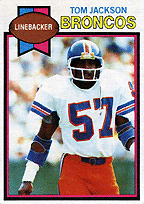 Tom Jackson,
1979 Topps
Tom Jackson,
1979 Topps |
Tom
liked the stage of the big game, and always played well under
pressure. No Denver fan will ever forget his playoff performance
against Pittsburgh at Mile High Stadium in December of 1976. In
the postseason for the first time in their history, the Broncos
throttled the mighty Steelers, 34-21. Tom picked off two passes
by Terry Bradshaw and recovered a fumble, setting up three Denver
scores. Of course, things didn't go as smoothly in the Super Bowl.
Tom
played for two titles with the Broncos, and lost both times. In
Super Bowl XII, Denver was steamrolled by the Dallas Cowboys,
27-10. Down by 13 points at the half, the Broncos rallied in the
third quarter, but a flea-flicker pass from Robert Newhouse to
Golden Richards sealed their fate. (It's worth noting, however,
that the offense deserved most of the blame, as Craig Morton and
crew turned the ball over eight times.) Nine years later, Denver
faced the New York Giants in Super Bowl XXI. Again the team was
blown out, as Phil Simms and Big Blue exploded for 30 points after
intermission to win easily, 39-20. Tom injured a knee early against
New York, and watched virtually the entire contest from the sidelines.
When he walked off the field, he knew his career was over.
|
|
| |
|
|
| Jdapoxe.com:
|
What
were your thoughts before and after each Super Bowl?
|
|
| |
|
|
| Tom
Jackson: |
I never
thought about the outcome being anything but us winning the game.
It never really crossed my mind that we would lose. I can remember
the night before Super Bowl XII when we were talking to the defense,
and I said to my teammates, "This time tomorrow night we
will be world champions. Tomorrow night at this time we will be
able to sit here and say that for at least one day we are the
best in the world." That’s the only thought process
I had. I thought that we had absolutely earned the right to play
for the title.
After
losing the game, you quickly learn that you don't get to win all
the time. Part of the reality of life is losing. Sometimes when
you lose, that process can be as important as the winning, and
maybe more so. It’s important to give credit where credit
is due.
One of
the things about which I am most proud is my reaction after losing
the biggest game in life—Super Bowl XXI. Reporters walked
into the dressing room, and I can't tell you how devastating the
loss was. Every one of those reporters, as the buses were leaving,
asked for a word from me. I stayed until the last bus left. There
were three of us— Billy Thompson and Rich Karlis and myself.
I made up my mind as the game ended that I would sit there and
answer every single question from the media. I was willing to
sit there when I was winning, and I would be willing to sit there
after losing, as well. Even in a losing cause I would not get
so frustrated that I would walk out on them. At the end of my
career, Rick Reilly, Larry Zimmer and other people who worked
for the press in Denver all said how much they appreciated my
willingness to sit down and talk with them during good times and
bad.
|
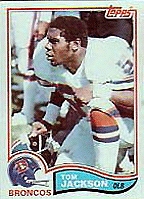 Tom Jackson,
1982 Topps
Tom Jackson,
1982 Topps |
Tom played for three coaches with the Broncos—John Ralston,
Red Miller and Dan Reeves. Under Ralston, Denver finished second
in the AFC West four out of five years, but was never a serious
playoff contender. That changed when Miller took over. After a
stint as offensive coordinator of the New England Patriots, he
brought the Broncos to the Super Bowl in his first season. Three
years later, Miller (whose real name was Robert) was replaced
by Reeves, and Denver embarked on a new era of prosperity.
The one constant throughout was defensive coordinator Joe Collier.
The brains behind the Orange Crush, he asked for an honest effort
from his players, and in return introduced them to innovative
schemes that helped revolutionize the NFL. Tom benefitted from
Collier's brilliance as much as anyone on the Broncos. Installed
at weakside outside linebacker, he was able to use his quickness
and instincts to their fullest advantage.
|
|
| |
|
|
| Jdapoxe.com:
|
What
did Collier bring to the game?
|
|
| |
|
|
| Tom
Jackson: |
He was as smart as anyone I have ever run into as far as
what he knew about how to play the 30 defense. To me, and I knew
it when I was in the midst of playing with the Broncos, he was
the best coach I was ever going to have in football. It translated
into the Orange Crush defense and into standing in the middle
of the Super Dome getting ready to play a Super Bowl. And, it
translated into true respect and admiration. This resurfaced when
I went back for Collier’s induction into the Colorado Sports
Hall of Fame. While I stood up at the banquet to say a few words
on his behalf, I conveyed those feelings of respect, admiration
and heartfelt appreciation.
I'm not the only one who feels that way about Joe. I didn’t
know it at the time he was coaching us that we would one day think
so highly of him. Toward the end of our playing days under Coach
Collier, we were willing to run through walls for him. He believed
in us as men— myself, Louis Wright, Steve Foley, Randy Gradishar,
Lyle Alzado—and never once did I hear him raise his voice.
It wasn’t about screaming it into us, but about development
of skills and character and the willingness to sacrifice for one
another. It's seldom in today’s game that you can get that
feeling [for a coach]. Because of the movement of players and
coaches from one team to another and the side effects of the salary
cap, it's difficult for long-term relationships to form.
|
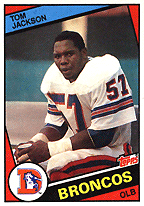 Tom Jackson,
1984 Topps
Tom Jackson,
1984 Topps |
Tom played with some Denver legends during his 14-year career. Of
course there was Elway, acquired in a trade with the Baltimore Colts
in 1982. Before he hit the scene, Tom's notable teammates included
Gradishar, Wright, receiver Haven Moses and kicker Jim Turner—all
of whom have a place in the Broncos' Ring of Fame. A seven-time
Pro Bowler, Gradishar never missed a game in 10 years, and retired
after the 1983 season as Denver's all-time leader with 1,958 tackles.
Wright, a world-class sprinter early in his career, was a sensational
one-on-one cover corner who allowed the Broncos to blitz whenever
they wanted. Moses, who averaged 18 yards per reception for his
career, was a dangerous deep threat with a knack for scoring touchdowns.
Turner, one of the last straight-on kickers, spent nine seasons
with the Broncos, amassing 742 points. This nucleus stayed together
for nearly a decade, a run that would be virtually impossible to
match in today's era of free agency.
|
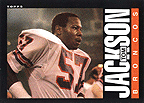 Tom Jackson,
1985 Topps
Tom Jackson,
1985 Topps |
| |
|
| Jdapoxe.com:
|
What was it like suiting up for one team your
entire career?
|
|
|
|
| Tom
Jackson: |
When you’re bunking with players like Randy Gradishar
for ten years, you get to know his life, and when he has problems
at home, you know about them. Your teammates become your brothers.
When I would go back to Cleveland with the Broncos to play the
Browns, I would take my teammates to my sister’s house where
she would cook spaghetti for them and we would break bread together.
As a result of our friendships, we would come out on Sunday and
there was a natural willingness to make sacrifices on the field
for one another. When we get together now, if we haven’t
seen each other for six months or so, it quickly seems as if it’s
only been a day or two between our visits.
There was a certain trust that was instilled in us when we
were teammates and will never leave us. It’s one of those
rare bonds. I’ve been so lucky to make those bonds in both
my athletic career and my professional broadcasting career alongside
Chris Berman at ESPN. Chris is truly like my brother. There is
nothing that I could ask of Chris that he wouldn’t do for
me and he feels the same about me.
|
Tom
moved into a broadcasting career almost as soon as his playing
career ended. Reeves offered him a job on his coaching staff,
but he wanted to explore life away from the sidelines. Personable
and insightful, he was a natural as a commentator. Since 1987,
"TJ" has occupied a chair next to Berman as a studio
host for ESPN. Among the others he has shared the desk with on
the network's signature shows—NFL Countdown and Primetime—are
Sterling Sharpe, Steve Young and Bill Parcells. The weekly Sunday
morning pre-game show has won five Sports Emmy Awards (1988, 1991,
1994, 1995 and 2001) and five Cable ACEs (1989, 1992, 1993, 1994
and 1995). Thanks to the same dedication that drove him on the
football field, Tom has become a polished and entertaining announcer.
|
|
| |
|
|
| Jdapoxe.com:
|
What's a typical Sunday for you during the football
season?
|
|
| |
|
|
| Tom
Jackson: |
I get
in at 9 o’clock in the morning. I have always compared it
to game day. There is a heightened intensity about everything
you are getting ready to do. There also is a level of excitement.
Most of the preparation for the pregame show takes place before
you get to Sunday, just as was the case when you play football.
During the course of the week, you’re doing research and
making many phone calls to coaches with whom you have formed
relationships. You’re asking questions about front-line
play and play-action passes.
On Saturdays,
when we have our production meetings, which is where we do the
bulk of our work, everybody walks into the room, and we begin
to break down the games. Everybody has different information because
they have spoken with different people. We throw this information
out and by the time we get through with our meeting, we’ve
got a pretty good handle on what to expect for the following day.
That meeting begins around 1 o'clock in the afternoon and we walk
out of there between 5 and 6 that night. That meeting is really
a joy because we get to do what we really like to do—and
that's talk football.
|
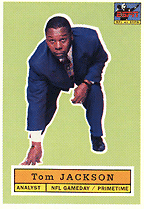 Tom Jackson,
ESPN promo
Tom Jackson,
ESPN promo |
| |
|
|
|









